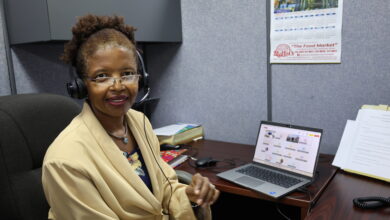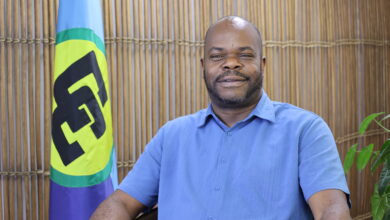At the last Conference of Heads of Government of the Caribbean Community matters relating to migration came up for discussion during Retreat. The Heads of Government considered several aspects of the issue, which was guided by a prepared paper, which included a section on The Caribbean Diaspora.
The youngest winner of the Guyana Prize for Literature, UWI-CARICOM Youth Consultant, Mr. Ruel Johnson offers a perspective on The Diaspora.
The Diaspora
by
Ruel Johnson
(The youngest winner of the Guyana Prize for Literature, he is currently a journalist)
History
The word, “diaspora” looms large in Caribbean history. It is entwined among the variegated roots of our origins, wraps itself like a liana around the solid if somewhat gnarled trunk of our common growth, and as some of our people branch off to a multiplicity of destinations, it blossoms, fructifies, and plants the seeds of our culture in whatever new lands they choose to inhabit.
We are, essentially – and to a great degree, uniquely – societies or a society composed primarily of diasporas. Our common Caribbean ancestors arrived here in what may termed within the context of a larger history as only very recently; from Africa, Asia and Europe, in addition to those indigenous to the landscape.
Caribbean identity today is enmeshed between two diasporic events. The first was due to the globalized nature of the sugar trade, which brought slaves and indentured labourers to these shores. All of our ancestors, except the Amerindians, came to these lands with identities that were located elsewhere. Under the necessarily repressive plantation system, the blunt force trauma of exploitation and subjugation, the cultural memories of our ancestors were eroded or corrupted. St. Lucian poet and Nobel Prize for Literature Laureate, Derek Walcott sums up this psychological damage more than ably in his poem Laventille, which he dedicated to V.S. Naipaul, Trinidadian Nobel Literature Prize Laureate. In the closing stanzas of the poem, Walcott writes:
“Something inside is laid wide like a wound,
some open passage that has cleft the brain,
some deep, amnesiac blow. We left
somewhere a life that we never found
customs and gods that are not born again,
some crib, some grille of light
clanged shut on us in bondage, and withheld
us from that world below us and beyond,
and in its swaddling cerements we’re still bound.”
Naipaul himself has treated what Walcott calls a “deep, amnesiac blow”, repeatedly in both his fiction and non-fiction works, especially within his An Area of Darkness, which explores the patches of nothingness within his own cultural identity. As the writer says in his Nobel Lecture,
“…[O]ur ancestral faith receded, became mysterious, not pertinent to our day-to-day life. We made no inquiries about India or about the families people had left behind. When our ways of thinking had changed, and we wished to know, it was too late.”
It may be argued that this loss of identity was essential in setting the stage for the tenuous cultural alchemy that was to follow, with its elements of racial pride, metissage (or miscegenation, as some would dub it), assimilation, conflict and cooperation.
Today
Today, the forges of history have given us our own distinguishable, if as yet nebulous, Caribbean cultural dynamic. And as a new paradigm of globalization is upon us, our peoples have been leaving their homelands, some in search of El Dorado of metropolitan wealth, some for higher learning, some for the sheer adventure of it.
What then are the differences between these two migrations, that of past and that of the present?
For one, the Caribbean people of today, whose ancestors came from many diasporas, are leaving as one. Despite the presence of some ethnocentric ‘Caribbean’ organizations around the world, the vast majority of Caribbean immigrants to countries like Canada, the US and the U.K. (and, it should be added, countries less known for accommodating Caribbean migrants), identify themselves first with their homeland, and with to the Caribbean region as a whole.
Another aspect in which the diaspora of today differs from the diaspora of yesterday is with the actual connection to home. While our ancestors suffered from a profound cultural loss because of the strictures of plantation life and the very real distance away from home, the Caribbean Diaspora of today have not only the benefit of social freedom, but also that of a world made virtually smaller by the advent of advanced communications technologies, the Internet in particular. In a book published in 2000, entitled The Internet: An Ethnographic Approach, authors Daniel Miller and Don Slater, argue that the cyberspace has created a virtual community in which Trinidadians at home and in the Diaspora are able to relate and interact within an environment that is for all intents and purposes, almost indistinguishable from traditional interaction. Caribbean people in the Diaspora are avoiding that “deep, amnesiac blow” by keeping themselves up to date with their culture and traditions by reaching out more and more to families and friends online.
The final and perhaps most significant difference between the people who came and those who either have left or are in the process of leaving, is their level of education. The original immigrants to the Caribbean were the dispossessed of their home countries, unskilled labourers here to work grinding, manual jobs, but jobs which nevertheless built up the economic stature of the colonial powers. The migrants who are leaving the Caribbean today are well educated, ambitious and savvy. As internationally syndicated columnist and Director for the Caribbean Council for Europe, David Jessop, wrote in an article entitled “The Caribbean Diaspora” (23-Mar-2003), “[t]he Caribbean’s most significant export is its people. Immigration requirements today make for a system in which the best and brightest of our people are gobbled by the machinery of metropolitan centres.
In a study commissioned by the Canadian Foundation for the Americas (FOCAL) Dr. Manuel Orozco, writes in his “Executive Summary” that:
“Central America and the Caribbean are experiencing the economic and social effects of new transnational actors, namely an emerging diaspora. These diasporas constitute important factors integrating their countries of origin in the hemisphere’s economy…The economic and business contributions of Central American and Caribbean citizens living in Canada and the United States are immense and signal a new type of relationship, not only in labour mobility, but also in trade and investment.”
Orozco went on to illustrate that persons within the diaspora of these countries contribute financially to their home economies to the tune of some ten billion US dollars annually. And that only accounts of course for the measurable amount transmitted through remittance services like Western Union. It does not factor in money physically carried by relatives on holiday, nor gifts sent by ‘barrel’ or brought to the region by hand.
At a symposium entitled the Jamaican Diaspora – Reciprocal Relations – The Way Forward, held Rabbi Robert Kaplan made the argument that the Caribbean migrants in the United States, and elsewhere, can take example from the Jewish lobby in that country, wherein organizations like the American Israel Public Affairs Committee (AIPAC) and the Anti-Defamation League (ADL) wield considerable, some say inordinate, influence on American domestic and foreign policy, particularly when dealing with the Jewish nation of Israel.
Another example of special interest lobbying that one may look at is that of the Cuban population in America and their political influence, especially in the state of Florida.
As David Jessop wrote in the fore-mentioned article,
”The Caribbean has an army already in the field that, if suitably mobilised and informed, can change policy. It also has economic muscle through investors, those that it trades with and the region's many influential friends. It is time the region made use of these strengths rather than continuing to plead its weaknesses.”
That may not be as simple a task as Jessop makes it out to be. Compared with the lobbies, say, of Israel and Cuba, the Caribbean citizens in the US, or more specifically the CARICOM citizens, do not suppose that they collectively possess a historically unifying cause in which to believe in; whereas the Jews have the fevered vision of the protection of Zion, and the Cubans have their hatred of the Castro regime, Caribbean citizens in the Diaspora have yet see a cause to champion such as the upholding of the status quo of the now defunct Lomé Agreement which had provided a haven for many small island economies up until the US government’s opposition to it.
There is yet another area in which the Caribbean can harness the tremendous potential of its Diaspora. The UWI-CARICOM Project came up, in October of 2002, with a project proposal for the establishment of a regional organization that would be geared to tap into the resources that can be offered by skilled retired and semi-retired Caribbean immigrants living in the Diaspora. The organization, labeled in the document as the Caribbean Executive Services Agency (CARES), would be modeled on the Canadian Executive Service Organisation (CESO) and the US-based International Executive Corps (IESC), the difference being of course, that it would be a regionally initiated and controlled body. With the CSM established in January 2006, and the expectation is that the Single Economy would be in place by 2008, an organization such as this one, if put in place, would prove invaluable in building the capacity of our fledgling Single Market.
Conclusion
Whatever the options, it is clear that we must start finding ways to start integrating the Diaspora into our overall vision of integration. Jamaican P.M., the Honourable P.J Patterson, in his CARICOM 30th Anniversary Lecture, in October last year, put forward the idea superbly when he said,
“I assert that the job of building the kind of Caribbean Society we desire is not restricted to those who are physically located within the geographic confines of the Caribbean Sea.
The “people” boundaries of CARICOM are not confined to the physical boundaries of our regional homelands. The living boundaries of CARICOM are to be found wherever CARICOM nationals or their progeny reside and work.”
The title of that lecture was “CARICOM Beyond Thirty: Connecting With The Diaspora”. If we are to more than just survive within the impending global economy, if we are to have a strong voice ready to roar our cause from deep within the belly of the beast as it were, we need, urgently to start connecting with the Diaspora.





